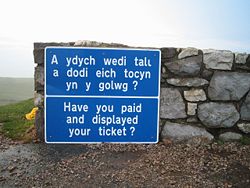Welsh language

This 'Welcome to Cardiff' banner greeted visitors to the Welsh capital in 2006.
The Welsh language—sometimes called Cymric—(in its own language Cymraeg) is a Celtic language spoken mainly in Wales and one corner of Patagonia in Argentina. Like English, its roots can be traced to the Proto-Indo-European tongue once spoken across Europe and central Asia. Its closest relatives are Cornish and Breton.
Today, about 20% of Welsh people identify themselves as Welsh speakers, and the popularity of the language is on the rise - a far cry from the nineteenth century, when children were often punished for speaking the language at school. Most speakers are found in North Wales, where the dialects are distinctly different from those spoken in South Wales. Though almost every speaker of Welsh is also bilingual with English, many older speakers in particular are more comfortable in Welsh. Their right to use the language in the public sector is guaranteed by law, with all public bodies required to display bilingual signs and provide services in both languages. Private companies and organisations, however, are simply encouraged to provide Welsh language provision. In 2011, Welsh became an official language of Wales through legislation passed by the Welsh Assembly.[1]
Language families
Welsh, like English, is an Indo-European language, so the two are distant cousins. Welsh is a Brythonic language in the same language family as Breton, spoken in France, and Cornish, spoken in Cornwall. Cumbric, once spoken in northern England and Scotland, was also closely related to Welsh. These Brythonic Celtic languages are very closely related to, but distinct from the Goidelic Celtic family which includes Irish, Scottish Gaelic and Manx.
Grammar
The grammar of Welsh differs from that of English in many respects: the verb is the first major constituent in the sentence by default, and there are masculine and feminine grammatical genders. The phonology, or sound system, differs significantly too: like Irish, consonants frequently 'mutate', changing their form when in contact. For example, the initial consonant of carreg, meaning 'stone', changes in the phrase fy ngharreg 'my stone'.[2] Even place-names undergo softening of the initial consonant: for example, the name of the capital city, Caerdydd (Cardiff), mutates initially to Gaerdydd and can soften further to Nghaerdydd. This phenomenon can make the use of dictionaries for translation somewhat difficult, without a solid grasp of the grammar.
Welsh and English

Official signs in Wales must be bilingual, usually Welsh first. The Welsh Language Act 1993 encourages, but does not require, private companies and organisations to provide Welsh-language material alongside English.
Welsh English has been influenced by Welsh in matters of accent and, perhaps, grammar, but the influence of one language on the other is more one-way than one might assume, given the proximity of England and Wales. Only a handful of Welsh words exist in English (e.g. corgi), whereas Welsh has borrowed many loanwords from English. This reflects the differing origins and fortunes of previous generations: Welsh developed from older Celtic tongues, while the precursors to English came to Britain much later, brought by Germanic tribes from continental Europe, whose descendants came to dominate the islands. Other examples of Welsh words in English are coracle and flummery, and three others relate to Welsh cultural events, history or institutions: eisteddfod, gorsedd and cist 'burial chamber' (the last ultimately from Latin).[3]
Footnotes
- ↑ BBC News: ''Historic' assembly vote for new Welsh language law'. 7th December 2010.
- ↑ BBC Wales: 'Nasal mutation'.
- ↑ World Wide Words: '[http:// Balderdash and flummery]'.